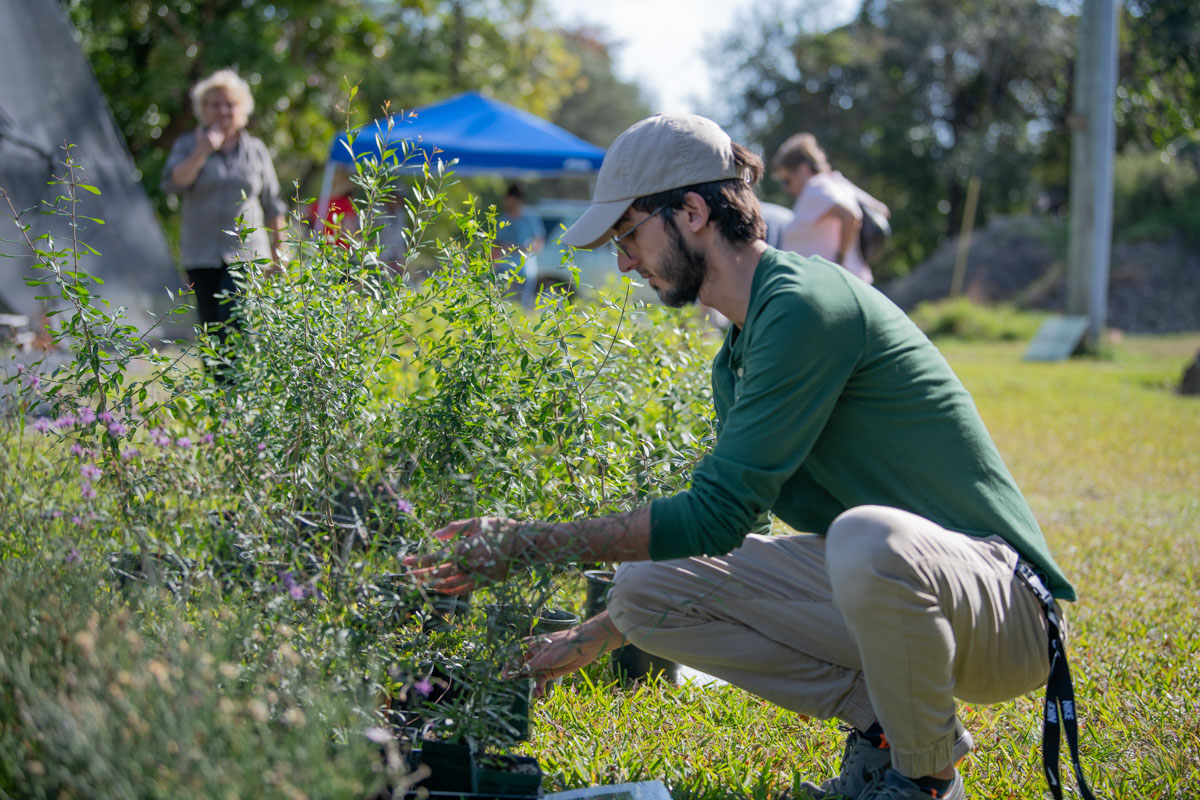Conservation

Native Plant Conservation
Native plant conservation at Fairchild is conducted by the Conservation Team– a small group of expert botanists and horticulturists who map, monitor, research, and grow plants native to South Florida and the Caribbean. Our program objective is to decrease the current rate of loss of our local flora. We have a diverse array of ongoing and completed projects, including rare plant reintroductions, seed banking, and ecological research. We have accomplished so much since our program began in the 1980s.
Want to get involved? Please consider joining our Connect to Protect Network!
Reintroductions
Fairchild plays an important role in the conservation of South Florida’s endangered plants through our rare plant introductions. We have the combination of factors needed to carry out reintroductions: horticultural facilities, a large base of volunteer labor, and scientific expertise. Since 1991, we have facilitated 81 reintroductions of 24 species, in collaboration with land managers at several agencies. We design most reintroductions as experiments, so that while we are returning a native species to a natural area, we are also learning about its ecology and biology. Some of the species for which we have conducted multiple reintroductions include Amorpha herbacea var. crenulata, Jacquemontia reclinata, Pilosocereus robinii, and Thelypteris patens.
Seed banking
Seeds are a major component of our rare plant collections, as stored seeds take up few resources, but can be sown to provide plants for reintroduction or research. Since seed storage behavior of subtropical species is difficult to predict, we often conduct experimental tests to help determine optimal seed storage requirements for these species. If seeds are determined to be “orthodox” (good candidates for storage), they are kept in our on-site seed bank and/or sent to the USDA’s National Center for Genetic Resources Preservation where they are placed in long-term storage.
Research
In addition to research relating to seeds and plant reintroductions, we also research the relationships between native South Florida plants and their ecosystems, especially in regard to best management and effective restoration practices. Links to some of our recent publications are below; a complete bibliography of recent scientific publications from Fairchild can be found here.
- Seed conservation of Keys tree cactus (Pilosocereus robinii)
- Plant diversity in fragments of globally imperiled pine rockland forest
- Croton linearis and endangered butterflies in Miami-Dade preserves
- Conservation alternatives for endemic taxa threatened by sea level rise
- When Is Local Best? Breeding history influences reintroduction survival
- Soil salinity and Keys tree cactus: implications for climate change
- Miami-Dade County Management Plan for the Richmond Pine Rocklands
Conservation Team Field ID guides
Fairchild’s Conservation Team has a deep appreciation for nature in subtropical South Florida, where our plants (and consequently insects and birds) are heavily influenced by the West Indies. In order to better understand our flora and fauna, we occasionally create informal field guides for our unique region of South Florida. These guides are free, but we always welcome donations (see below). We hope you enjoy them!
Moths of South Florida (PDF)
Ferns of Miami-Dade Preserves (PDF)
More coming soon!
Conservation team staff
Jennifer Possley, MS – Program Manager – Jennifer keeps busy both in the field and behind the desk, managing all aspects of the Conservation Team, from accounting and conferences to field monitoring. Email: [email protected].
James Lange, BS – Lead Botanist – Jimmy is based in Broward County where he manages grants that focus on lands north of Miami. He spends much of his time in the outdoors, where he monitors, maps, and studies our region’s flora. Email: [email protected].
Brian Harding – Horticulturist – Brian grows the many different native plants at our nursery, including those that are part of our National Collection with the Center for Plant Conservation. He also spends part of his time on field work. Email: [email protected] .
Lydia Cuni, MS – Field Biologist – Lydia is the Conservation Team’s field biologist, thus she can often be found in the great outdoors of Miami-Dade and Monroe Counties, mapping, monitoring and researching our region’s native flora. Email: [email protected].
Sabine Wintergerst, PhD – Seed Lab Manager – Sabine manages the Team’s seed banking and seed research (especially on seed storage potential and dormancy breaking). She also mentors interns. Email: [email protected].
Daniela Champney – Connect to Protect Network Manager – Daniela runs the daily business of CTPN including membership, our location database, outreach and events. Email: [email protected].
Funding sources
Fairchild’s Conservation Team is funded by grants from several different agencies, as well as by private donors. We also rely on individual donations, who can make a big impact on our work. If you wish to donate to the Conservation Team, please contact [email protected], or call 305-667-1651 ext 3309. Let them know you would like to support the Conservation Team. You may also contact Conservation Team Leader Jennifer Possley at [email protected] or ext 3514. Thank you to our recent supporters, including:
The Florida Dept. of Agriculture and Consumer Services
Florida’s Endangered Plant Advisory Council
Miami-Dade County, Dept. of Parks Recreation and Open Spaces
US Fish and Wildlife Service
US National Park Service
The Center for Plant Conservation
Broward County Parks and Recreation
Individual private donors
